Egypt has publicly offered to host Palestinian faction
leaders on its soil and warned Israel that any strike against these figures
within Egyptian territory would be considered a declaration of war. This stance
follows Israeli air strikes in Doha targeting Hamas leaders, amid ongoing
mediation efforts by Egypt to broker ceasefire agreements and post-war
governance arrangements in Gaza.
Egypt’s Diplomatic Role Amid Conflict
Egypt is intensifying its involvement in Palestinian
reconciliation and ceasefire negotiations, offering to host Palestinian faction
leaders, including Hamas and Fatah. This initiative forms part of Egypt's
broader efforts to broker a diplomatic solution to the ongoing conflict between
Israel and Palestinian groups in Gaza and the West Bank.
As reported by the Anadolu Agency on September 6, 2025,
Hamas held talks in Egypt alongside representatives of various Palestinian
factions, civil society, and public figures to discuss a "national
roadmap." The purpose of these discussions is to unify Palestinian efforts
to end Israeli military operations and prepare governance for post-war Gaza.
The talks coincided with escalatory Israeli military operations in Gaza and the
West Bank.
Warnings Against Israeli Strikes on Egyptian Soil
Following a series of Israeli air strikes on residential
buildings in Doha targeting Hamas leaders, Egyptian authorities issued stern
warnings against similar attacks within Egypt.
Middle East Eye reported on September 11, 2025, that Egypt
discovered Israeli attempts to assassinate Hamas leaders on its territory
during ceasefire negotiations over the past two years. A high-level Egyptian
security source told the outlet that any strike by Israel on Hamas figures inside
Egypt would be treated as a violation of Egyptian sovereignty equivalent to a
declaration of war, with Egypt prepared to retaliate.
Adding to these warnings, Major General Samir Farag, a
military expert, told RT that Israel “would not dare” target Palestinian
figures on Egyptian soil as it did in Qatar. He emphasized that Egypt would
respond robustly, without appealing to international forums for condemnation,
citing Egypt’s military strength and regional influence.
Egypt's Position on Palestinian Governance Post-War
Egypt is also mediating talks between rival Palestinian
factions Fatah and Hamas aimed at post-war governance of Gaza. According to The
Times of Israel on December 1, 2024, Egypt's Foreign Minister Badr Abdelatty
confirmed that delegations from Fatah and Hamas are convening in Cairo to
discuss managing daily affairs in Gaza under the full authority of the
Palestinian Authority (PA) following Israeli military withdrawal.
These talks reflect ongoing disputes between Fatah, which
dominates the West Bank, and Hamas, which has controlled Gaza since 2007. Egypt
insists the PA must be empowered to govern Gaza transparently after the
conflict, despite Israel’s scepticism toward Hamas and Mahmoud Abbas’ PA.
Egypt’s Humanitarian and Security Stance
President Abdel Fattah el-Sisi publicly supports the
ceasefire efforts and the delivery of humanitarian aid to Gaza, reiterating
Egypt’s rejection of Israeli reoccupation or mass displacement of Palestinians.
In a September 7, 2025 address to the BRICS summit, Sisi condemned Israel’s
military operations as "most heinous forms of killing and terror,"
accusing Israel of using starvation and denial of medical services as weapons
against Palestinians.
Egypt continues to push for humanitarian relief via the
Rafah crossing and emphasises Iraq's readiness to protect Palestinian leaders
on its soil. Foreign Minister Badr Abdelatty has also highlighted the “red
line” represented by the displacement of Palestinians from Gaza, warning it
threatens Egypt’s national security and sovereignty.
Israel’s Response and Regional Implications
Israeli Prime Minister Benjamin Netanyahu has repeatedly
rejected ceasefire proposals, instead threatening to expand military actions
beyond Gaza, including targeting Hamas leaders in other countries. This
rhetoric heightens regional tensions, as Egypt strongly protests any Israeli
violations of its sovereignty.
Reportedly, Egyptian officials are actively coordinating
with Qatar and the US in indirect negotiations between Israel and Hamas to
reach a prisoner swap and ceasefire deal. Yet, Netanyahu’s rejectionism has
stalled progress despite Hamas’ acceptance of multiple draft agreements.
The broader context involves over 64,000 Palestinian deaths
since October 2023 in the Israeli military campaign, with International
Criminal Court arrest warrants issued against Netanyahu and some of his
ministers for alleged war crimes. Egypt’s warnings and role as mediator
position it as a significant regional actor balancing diplomacy and defence of
its territorial integrity.
